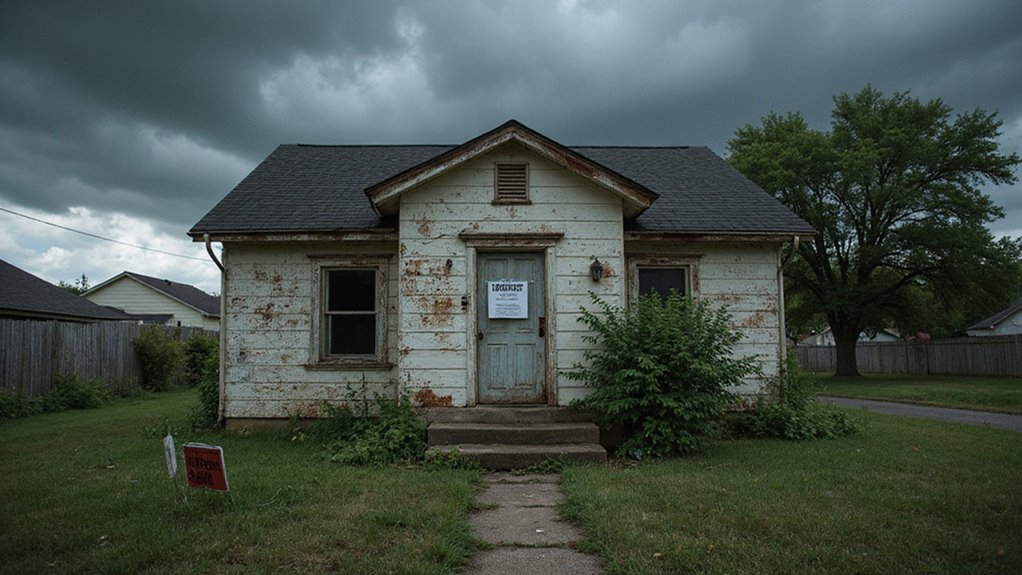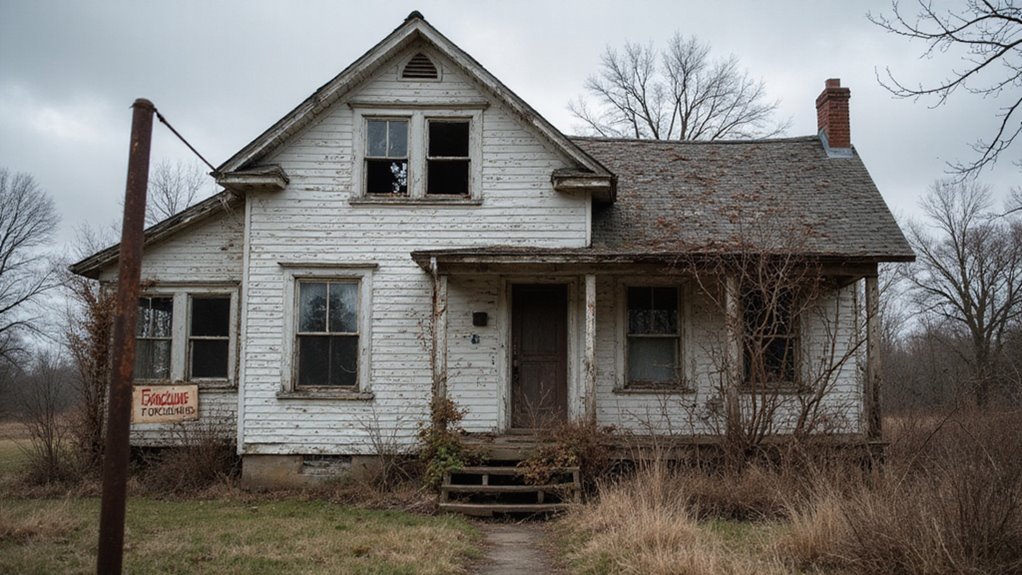Facing foreclosure doesn’t mean the end of your homeownership journey. Foreclosure notices strike fear in homeowners, creating overwhelming stress and financial uncertainty. Time works against you as lenders move forward with legal proceedings. However, selling your property remains a viable escape route when navigated properly.
Yes, you can absolutely sell a house in foreclosure before the sheriff’s sale occurs. This requires quick action, lender coordination, and possibly arranging a short sale depending on your equity situation. The foreclosure timeline continues regardless of your intentions, so immediate steps are necessary.
In this blog I will explore everything related to selling a house during foreclosure.
Key Takeaways
- Yes, homeowners can sell their house during foreclosure before the sheriff’s sale with lender approval.
- Selling in pre-foreclosure helps homeowners retain ownership rights and reduce financial damage.
- Proper documentation, including financial hardship letters and foreclosure notices, is necessary for the sale.
- Working with foreclosure specialists and real estate professionals can streamline the process and maximize sale value.
- Legal compliance and timely negotiations are crucial to avoid additional penalties or complications.
What is Foreclosure and Why Does it Happen?

Foreclosure is a legal process when lenders take back homes from owners who can’t pay their mortgage. It typically occurs after three to six missed payments. Homeowners lose property rights, and lenders sell the home to recover their money.
Financial hardship, job loss, medical emergencies, or divorce often trigger this situation. Understanding foreclosure helps you avoid it or assist others facing this challenge.
The foreclosure timeline averages over two years in many states. Swift action can prevent credit damage. Additionally, communicating with your lender early may create options for loan modification or payment plans.
Can You Legally Sell a House in Foreclosure?

Yes, homeowners can legally sell a house during foreclosure, but only before a sheriff’s sale occurs.
The law allows property sales during pre-foreclosure stages when you still maintain ownership rights. Your lender must approve the transaction, particularly for short sales. This approval becomes essential when sale proceeds won’t cover your mortgage balance.
An experienced real estate attorney helps navigate these complex transactions.
Furthermore, legal guidance protects your financial interests throughout the process. The right professional support ensures compliance with state foreclosure laws.
In essence, selling before foreclosure completion remains a legal option that may help minimize financial damage.
What Are Your Options When Facing Foreclosure?

When facing foreclosure, you need to investigate all your options quickly, including loan modification or reinstatement to catch up on payments, or seeking lender approval for a short sale.
You might also consider a deed in lieu of foreclosure to transfer ownership voluntarily or sell your home to investors through a traditional listing before the auction.
Act fast—each choice has deadlines and legal hurdles that could determine whether you keep your home or lose it.
Loan Modification or Reinstatement
You can prevent foreclosure through loan modification or reinstatement. Loan modification changes your loan terms to make payments affordable.
Reinstatement involves paying all overdue amounts at once to restore your loan.
Both options allow you to keep your home while resolving mortgage issues. Modifications typically require proof of financial hardship and stable income to qualify. Your lender will evaluate your situation based on specific criteria.
Contact your mortgage servicer immediately if you’re falling behind on payments. Documentation of your finances strengthens your case.
Professional housing counselors can guide you through this process for better outcomes.
Short Sale Approval
Lender approval is required for a short sale transaction. You must submit financial statements, hardship letters, and a proposed sale price. This complete package helps the lender evaluate your situation.
Approval typically takes between 90 to 120 days or longer depending on your lender.
Most lenders can waive deficiency judgments, which prevents them from pursuing you for the remaining debt. This waiver offers significant protection for your financial future.
The short sale process provides an alternative to foreclosure when you can’t pay your mortgage. Your lender agrees to accept less than the full amount owed on your property.
Deed in Lieu of Foreclosure
A deed in lieu of foreclosure lets you voluntarily surrender your home to avoid foreclosure. You give your property title to the lender and cancel the mortgage debt. This option requires proof of financial hardship and active negotiation with your lender.
The process typically damages your credit score less than a complete foreclosure. Most lenders require you to attempt selling your home first before accepting this option.
Furthermore, this arrangement can free you from mortgage stress more quickly. To begin this process, contact your lender and request their specific requirements.
Cash Sale to Home Investors
Cash investors offer a quick escape from foreclosure. They purchase homes fast, often within days, and buy properties “as-is.” You won’t need to spend money on repairs before selling.
Most investors can close in as little as 7-10 days compared to traditional sales that take 30-60 days. This option helps preserve your credit score by avoiding a formal foreclosure on your record.
Moreover, cash sales provide immediate financial relief when you need it most. The process eliminates real estate agent commissions and reduces closing costs.
As a result, you can move forward with fewer financial burdens and less stress.
Traditional Real Estate Listing
Yes, you can list your home traditionally even during foreclosure. This approach can protect your credit score and maximize sale value. Work directly with your lender to obtain current payoff amounts. You must clear all property liens before closing can occur.
Find a realtor with specific foreclosure experience. They understand timeline constraints and lender requirements. Always disclose your foreclosure status to potential buyers. This transparency builds trust and prevents future legal issues.
Furthermore, prompt action may halt the foreclosure process entirely. Taking this path serves your financial interests better than waiting until it’s too late.
How to Sell Your Foreclosed Home?
To sell your foreclosed home quickly, you need to determine its current value and get lender approval first.
Then, gather all required documents and prepare your property for sale, making it appealing to buyers.
Finally, you must market effectively and negotiate offers, knowing the lender’s input is essential at every step.
Determining Your Home’s Current Value
You can learn your home’s current value through multiple reliable methods. Start with free online valuation tools that provide estimates based on comparable properties. These tools typically require basic property information and deliver results in minutes.
Next, research recent sales of similar homes in your neighborhood.
Local market data offers valuable context for understanding your property’s position in today’s market.
Professional appraisals provide the most accurate valuations. Additionally, real estate agents can perform Comparative Market Analyses that factor in your home’s unique features.
Furthermore, your mortgage statement shows your loan balance, which helps determine your equity position.
Getting Permission From Your Lender
You must get your lender’s approval before selling a foreclosed home. Contact your lender with your proposed sale price and any offers you’ve received.
Request a payoff statement to understand the exact amount needed to clear your debt. Laws require lender permission during the redemption period.
The approval process involves submitting documentation and waiting for review.
Professional foreclosure legal advice can help navigate these requirements more efficiently. Many lenders prefer selling over completing the foreclosure process.
This preference often makes them willing to cooperate with reasonable sale proposals.
Preparing Necessary Documentation
You need these four key documents to sell a foreclosed home. Your mortgage statement and foreclosure notices show your current financial position.
A title report reveals any liens against your property. The property disclosure statement builds trust with potential buyers. Records of lender communications support your selling efforts.
Organize these papers before listing your home. This preparation saves time during negotiations. Well-prepared documentation attracts serious buyers more quickly. Furthermore, clear paperwork reduces complications during closing.
Most states require disclosure of foreclosure status by law. Complete honesty prevents future legal issues.
Marketing Your Property Effectively
Effective marketing attracts buyers to your foreclosed property. Clear photos, virtual tours, and detailed descriptions showcase your home’s best features online. Local realtors know which selling points appeal most to your area’s buyers.
Strategic pricing remains crucial for generating interest. Properties priced within 5% of market value typically sell 50% faster than overpriced homes. As a result, research comparable sales carefully before setting your price.
Online platforms like Zillow, Redfin, and social media reach thousands of potential buyers instantly. Additionally, traditional open houses and neighborhood flyers help capture local interest.
These multi-channel approaches maximize your property’s visibility in a competitive market.
Negotiating With Potential Buyers
Successful negotiations with potential buyers require honesty and strategic planning. Always disclose the foreclosure status upfront to build trust.
Buyers often respond to incentives like closing cost assistance or repair allowances. Try to complete negotiations at least 21 days before any scheduled auction date. Work with agents who understand foreclosure transactions for better results.
Flexibility on price and terms can attract more buyers. Present clear exit strategies from the foreclosure situation. Address concerns about property condition or title issues immediately.
Most importantly, remain patient throughout the process. The right buyer values transparency and fair negotiations.
What Are the Benefits of Selling Before Foreclosure?
Selling before foreclosure can save your credit score from lasting damage and help you recover some of your equity.
It puts you in control of the sale and timeline, avoiding the rush of court deadlines and auction pressures.
Plus, it stops further debt buildup and reduces the stress and uncertainty that come with an impending foreclosure.
Avoiding Credit Score Damage
Sell your home before foreclosure to protect your credit score. Foreclosure can damage your credit report for up to seven years. A pre-auction sale prevents this long-term negative mark.
Your credit remains in better standing when you avoid foreclosure. Future lenders will view you more favorably. You’ll also escape the social and professional stigma of foreclosure.
Furthermore, taking control of the situation reduces financial anxiety. Quick action preserves options for future home purchases.
In addition to personal benefits, you contribute to market stability by preventing another distressed property.
Potentially Recovering Some Equity
Yes, you can recover some home equity by acting before foreclosure occurs. A proactive sale allows you to set your price and maximize returns. This approach puts you in control of the selling process.
You’ll avoid the significant equity loss that typically happens during foreclosure.
Property values that have increased since purchase create even better recovery opportunities. The timing of your sale matters greatly in this situation. Foreclosures typically sell for 15% below market value.
Furthermore, this strategy helps protect your credit score and financial future. Your recovered equity can provide a fresh financial start.
Eliminating Further Debt Accumulation
A quick home sale before foreclosure prevents your debt from growing larger. You won’t accumulate additional late fees when you act early.
Legal costs can add thousands to your existing mortgage debt. Lenders may pursue deficiency judgments for remaining balances after foreclosure.
Proactive selling creates opportunities for negotiation with your lender. Many banks prefer settlement over lengthy foreclosure processes. As a result, you might secure partial debt forgiveness.
Your credit score will suffer less damage than with a completed foreclosure.
Furthermore, this approach helps preserve your financial stability. You maintain control over the selling process rather than surrendering it to banks.
Gaining Control Over the Selling Process
You can take charge of your home sale before foreclosure happens. This control allows you to set deadlines, negotiate prices, and dictate terms. You decide when to list the property and how to market it effectively. Your schedule becomes the priority, not the bank’s timeline.
The benefits extend beyond timing alone. You can select your own real estate agent and target specific buyers.
Pre-foreclosure sales typically bring 15-20% higher prices than foreclosure auctions. This financial advantage helps protect your credit score and future borrowing ability.
Furthermore, you maintain dignity throughout the process. No foreclosure notices appear on your property or in public records. The transition to your next home becomes less stressful and more manageable.
Reducing Stress and Uncertainty
Taking action before foreclosure reduces anxiety and provides clarity. You gain control of your situation instead of facing unknown outcomes. This control helps preserve your mental wellbeing during a difficult time.
Avoiding foreclosure can prevent up to seven years of negative credit impacts. You may save thousands by selling properly rather than letting the bank take your home. Many lenders will work with you on remaining balances when you show good faith.
The freedom to choose your moving timeline creates space to plan your next steps. This independence allows you to transition on your terms rather than the bank’s schedule.
What Challenges Might You Face During the Sale?
Foreclosure sales often face tight timelines and unexpected hurdles. Title issues can emerge, making potential buyers hesitant to proceed. Lenders may impose restrictions that delay the process.
Properties owned by banks typically involve complex financing requirements. Coordinating between multiple parties adds another layer of complexity. Your lender, attorney, and potential buyers must all work in sync.
Legal professionals help navigate paperwork and ensure compliance with foreclosure laws. Despite these obstacles, preparation can minimize disruptions. Clear communication with all involved parties proves essential for a successful transaction.
How Fast Can You Sell a Foreclosed Property?
A foreclosed property can sell within 7-90 days depending on your chosen method. Cash sales typically close in 7-14 days. Traditional agent listings take 30-90 days.
Your market conditions and property condition significantly affect this timeline. Speed depends on buyer interest and your preparation level. Clean, well-priced properties sell faster. Short sales require lender approval, which may add weeks to the process.
For the best results, gather all necessary documents early. Additionally, consider working with professionals who specialize in foreclosures. Quick action protects your credit and reduces financial stress.
Ready to Sell Your Foreclosed Home? Contact Prestige Investments Cincinnati Today
Contacting Prestige Investments Cincinnati is an effective solution for selling foreclosed homes quickly. We specialize in distressed property sales and offer comprehensive support throughout the process. Our quick sale service helps homeowners avoid lengthy auction delays. Prestige coordinates with lenders to simplify the approval process for you.
All documentation is handled properly to ensure full legal compliance with foreclosure laws. The team uses their market expertise to maximize your property’s sale value despite challenging circumstances. After the sale, we provide support options for financial recovery. This complete approach makes Prestige Investments Cincinnati a valuable partner during foreclosure situations.
Don’t wait until it’s too late—selling your foreclosed home is your best shot at minimizing damage and taking control of your future. Act quickly, understand your options, and navigate the process with confidence. The clock is ticking, and every moment counts in turning things around. Stay proactive, keep your eyes on the prize, and don’t let this opportunity slip through your fingers. The sooner you act, the better your chances of coming out ahead.





